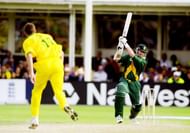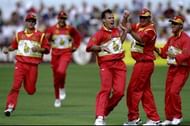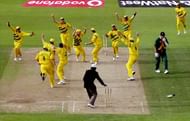
The dominance of the Australian cricket team in world cricket began following their triumph at the 1999 World Cup under the leadership of Steve Waugh. From there on, the team were nearly invincible for the next eight to ten years as they won two more World Cups and two Champions Trophies during that period.
However, Lady Luck played her part in Australia’s World Cup win in 1999 as they were nearly knocked out of the tournament in the Super Six stages, only for Herschelle Gibbs to unintentionally grant them a lifeline in the tournament.
During the final Super Six match of the tournament at Headingley, Australia had to chase down a target of 272 against South Africa to qualify for the semi-finals ahead of Zimbabwe. The Aussies were in a pickle at 48 for three with Ricky Ponting and Steve Waugh at the crease. However, the duo brought Australia back into the game with their half-centuries.
During the final ball of the 31st over, Lance Klusener bowled a delivery to Steve Waugh, who was batting on 56. The Aussie skipper got an inside edge and flicked the ball to midwicket where Gibbs got his hands to it before dropping the catch out of excitement.
Extra Cover: What if Jonty Rhodes had not run out Inzamam-ul-Haq in the 1992 World Cup?
Waugh had the last laugh as he went on to score a brilliant 120 and guided Australia to the semi-finals. The semi-finals, as we all know, ended in a tie against South Africa, and the Kangaroos reached the final by virtue of a higher net run-rate.
The South African players might have wondered how different things could have been if Gibbs, who was one of South Africa’s finest fielders, had held on to the catch.
Here are five things that would have happened if Gibbs hadn’t dropped Waugh in the super-six match.
#5 We wouldn’t have witnessed Steve Waugh’s best performances of the tournament
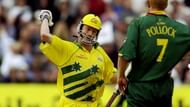
During the 1999 World Cup, Waugh put up a couple of fairly decent performances in the group stages, which was followed by innings of 36 and 62 in the first two Super Six games against India and Zimbabwe respectively.
During Australia’s must-win match against South Africa, Waugh joined Ricky Ponting at the crease when Australia were struggling at 48/3, chasing a target of 272. He began his innings very slowly but then gradually began to speed up as he reached his half-century in 47 deliveries.
When Waugh was batting on 56, he flicked a Lance Klusener delivery straight towards Gibbs, only for the latter to drop it. Waugh cashed in on this narrow escape as he went on to score his second ODI century and achieve his highest ODI score of 120 as Australia reached the semi-finals.
This was followed by a crucial 56 from 76 deliveries in the semi-finals, which helped Australia come back from 68/4 to post a decent total of 213. South Africa managed exactly 213 in reply and the match ended in a tie, with the Aussies progressing to the final by virtue of a higher net run rate.
Australia eventually went on to win the tournament and Waugh ended as the second highest run-scorer of the competition with 398 runs, 63 behind top-scorer Rahul Dravid.
#4 We wouldn’t have witnessed Lance Klusener’s semi-final fireworks
Lance Klusener is regarded as one of the greatest South African all-rounders of all-time and one of the best pinch-hitters. Klusener was at the peak of his powers at the 1999 World Cup and was adjudged the Player of the Tournament for his brilliant performances with both bat and ball.
Klusener delivered in every single game but perhaps his most memorable performance of the competition was his 16-ball 31 in the semi-final against Australia. While chasing 214, South Africa got off to a steady start but began to struggle after losing their openers, Gibbs and Gary Kirsten.
Jacques Kallis and Jonty Rhodes’ partnership of 84 for the fifth wicket combined with Shaun Pollock’s 14-ball-20 got South Africa back into the game. However, once all three were dismissed, South Africa were left reeling at 183/7, needing another 31 runs off the final 25 balls with two new batsmen at the crease in Klusener and Mark Boucher.
Known for performing brilliantly in crunch situations, Klusener began his innings steadily but two wickets in the 49th over put the Proteas in a tricky position.
However, the all-rounder restored hope, hitting a six off the penultimate ball of the 49th over before taking a single to keep strike in the final over, with South Africa requiring nine to win.
In the final over, Klusener hit two consecutive boundaries off Damien Fleming to level the scores and South Africa were all but assured of a place in the final at Lord’s before disaster struck. Klusener mishit the third delivery towards Darren Lehmann while Allan Donald was way out of his crease.
Lehmann missed his throw and Donald somehow survived.
In the very next delivery, Klusener hit the ball down the ground towards Mark Waugh and set off for a single while Donald was still in his crease. By the time the latter began to run, Waugh threw the ball towards Fleming who threw it towards Gilchrist who ran Donald out to end South Africa’s World Cup hopes.
Even though Klusener’s 31 came in a lost cause, it was still one of the finest innings of the tournament and this may not have happened if Gibbs had not dropped Waugh during the Super Sixes.
#3 Zimbabwe would have been World Cup semi-finalists
The late 1990s was the golden age of Zimbabwean cricket as they had the likes of Andy Flower, Grant Flower, Alistair Campbell, Heath Streak, Neil Johnson, Henry Olonga, Guy Whittall, and many other top class players.
The 1999 World Cup was Zimbabwe’s best performance at a World Cup as they beat the likes of South Africa and India in the group stages. Despite losing to England and Sri Lanka, Zimbabwe’s margin of defeat was low enough to grant them a place in the Super Sixes.
With both India and South Africa qualifying for the Super Sixes, Zimbabwe had a huge advantage as they would be carrying the four points from their first round wins in to the Super Six stage. After a washout in their first Super Six match against New Zealand, Zimbabwe lost to Australia and Pakistan but still had a chance to qualify for the semi-finals if South Africa defeated Australia in the final match.
At one point, it looked like Zimbabwe would reach the semis as the Aussies were struggling at 48/3 while chasing 272. South Africa missed a golden opportunity to dismiss Waugh as Gibbs dropped him on 56. That dropped catch affected Zimbabwe as much as it did South Africa as Waugh went on to score an unbeaten 120 to take his side to the semi-finals.
Had Gibbs held on to that catch then there was a good chance that South Africa would have won the match and Zimbabwe would have qualified for the semi-finals where they would have faced South Africa.
#2 We would not have witnessed Shane Warne’s best bowling of the tournament
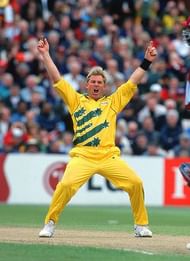
Aussie spinner Shane Warne was in very good form during the 1999 World Cup and by the end of the Super Sixes, had equalled his tally of 12 wickets in the 1996 World Cup. Till the Super Sixes, Warne’s best bowling figures of the tournament were 3/39 that came in Australia’s first match of the tournament against Scotland.
However, Waugh’s dropped catch benefitted Warne immensely as in the following two matches, he produced his best bowling of the competition to be adjudged the Man of the Match on both occasions.
During the semi-final between Australia and South Africa, Australia ended their innings on 213 and in reply, the South African openers Herschelle Gibbs and Gary Kirsten gave their side a steady start to the innings. The duo added 48 runs before Warne broke their partnership by bowling out the well settled Gibbs.
In his very next, over the spinner scalped Gary Kirsten and Hansie Cronje to pile the pressure on the South African batting. Warne ended his brilliant spell by taking the prized wicket of Jacques Kallis who was in fine form. The spinner finished the match with figures of 4/29.
In the final against Pakistan, Warne bowled another brilliant spell of 4/33, taking the wickets of Ijaz Ahmed, Moin Khan, Shahid Afridi, and Wasim Akram as Pakistan were bundled out for a paltry 133.
Australia comfortably chased down the total in 20.1 overs to win their second World Cup. Warne’s consecutive four-wicket hauls in the semi-final and final made him the joint-top wicket-taker of the tournament alongside New Zealand pacer Geoff Allott.
#1 South Africa would have won the 1999 Cricket World Cup
South Africa’s exit in the semi-finals of the 1992 World Cup was unfortunate as rain left them requiring 22 runs from 1 ball according to Duckworth-Lewis. In the 1996 World Cup, the Proteas were brilliant in the group stages as they won all five of their matches but perished to the West Indies in the quarter-finals.
South Africa were one of the favorites heading into the 1999 World Cup as they had a very solid team filled with world-class cricketers. They were in terrific form during the group stages with a surprise defeat against Zimbabwe being their only slip-up.
They topped their group and qualified for the Super Sixes where they beat Pakistan in a close contest before beating New Zealand convincingly to secure a berth in the semi-finals. This meant that their final Super Six match against Australia was merely a formality.
However, that match turned out to be a deciding factor in the longer run. After putting up a total of 271 thanks to Gibbs’ ton, South Africa had Australia right where they wanted them as the Aussies were struggling at 48/3 before Waugh and Ponting kept the Australians alive.
However, the dropped catch off Waugh eventually went on to cost South Africa the World Cup as he scored a brilliant 120 to take his side to the semi-finals. In the semis, after tieing their game against South Africa, the Aussies progressed to the finals via a higher net run rate.
Had South Africa not dropped the catch, though, such a scenario would never have risen and the Proteas might have gone all the way to lift the trophy.
Looking for fast live cricket scores? Download CricRocket and get fast score updates, top-notch commentary in-depth match stats & much more! 🚀☄️
